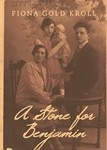A Stone for Benjamin
 I’ve received several emails this week asking me when my book A Stone for Benjamin will be published. “It’s close, possibly during the next two weeks,” I tell them. Then, they ask me what my book is about. When I give them a brief summary, most people are shocked to learn that the Vichy government of France collaborated with the Nazis during World War 2 in the arrest, detention and deportation of 76,000 Jewish men, women and children. Then they ask me how many people survived; often silence is followed by incredulous disbelief when I tell them there were 2,500 survivors who returned to France. While historians have written many books about France during World War 2, I have come to realize that very little is known outside of France about this terrible part of the Holocaust. It was kept quiet for many years after the war ended in 1945, swept under the carpet so to speak until 1995 when Jacque Chirac made a public statement acknowledging the French Vichy government’s complicity.
I’ve received several emails this week asking me when my book A Stone for Benjamin will be published. “It’s close, possibly during the next two weeks,” I tell them. Then, they ask me what my book is about. When I give them a brief summary, most people are shocked to learn that the Vichy government of France collaborated with the Nazis during World War 2 in the arrest, detention and deportation of 76,000 Jewish men, women and children. Then they ask me how many people survived; often silence is followed by incredulous disbelief when I tell them there were 2,500 survivors who returned to France. While historians have written many books about France during World War 2, I have come to realize that very little is known outside of France about this terrible part of the Holocaust. It was kept quiet for many years after the war ended in 1945, swept under the carpet so to speak until 1995 when Jacque Chirac made a public statement acknowledging the French Vichy government’s complicity.
When I decided to write a book about my own journey, searching for my missing French great-uncle, I also had to make an important decision.Should the story be a non-fiction memoir or a novel based on fact? But, I suspected I would diminish the facts if I wrote it as a novel.It’s curious as to why I would feel that way, considering I enjoyed reading “Everything is Illuminated” and “Sarah’s Key.” However, while both of these books contain some historical facts, the characters and story lines are fictional. Some would argue that if novels on the subject of the Holocaust receive wider readership, then they not only entertain but also educate and should therefore be published. But, I believe there are still thousands of true Holocaust stories still waiting to be uncovered and written, and those are the stories and books that should be published before the novels. That was my goal when I wrote A Stone for Benjamin, and ultimately that’s what I did.
